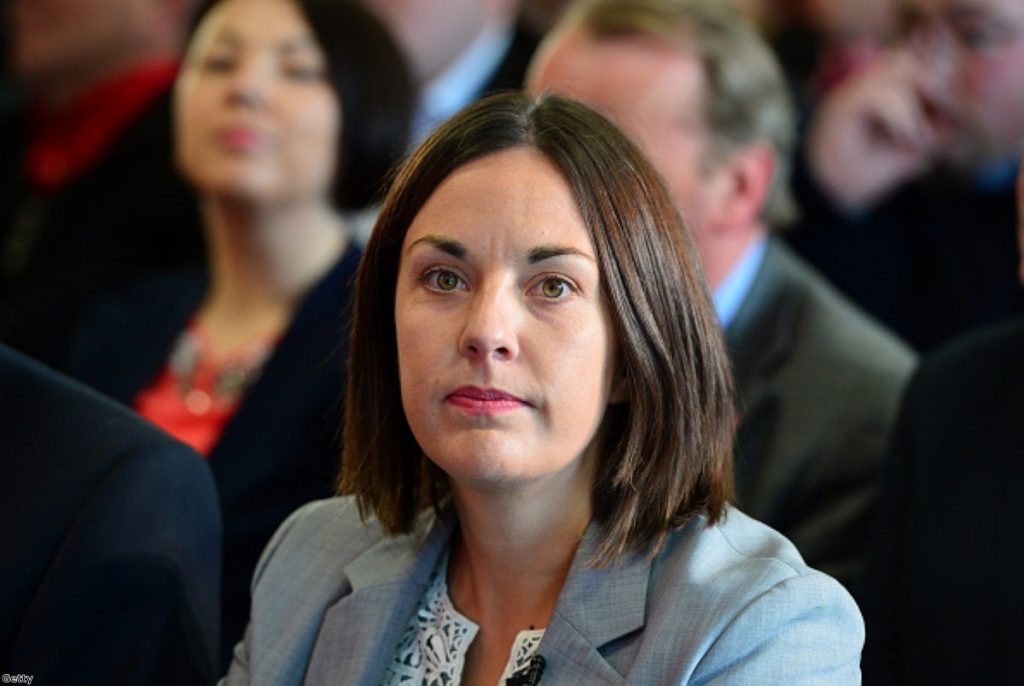Kezia Dugdale shows why only Corbyn can save the Union
Kezia Dugdale's first interview as Scottish Labour leader on the Today programme this morning summed up why the party is lost north of the border. This wasn't the start of a fresh chapter. It was the same old failure all over again.
Dugdale's performance was one of absence. She refused to adopt any substantial political position or give yes or no answers to simple questions. She issued meaningless stock responses about wanting the best teachers for primary schools, like the one she repeatedly mentioned she was visiting later. It was a classic example of the vacuous modern political performance.
The Scottish Labour leader was reminded of comments she made about Corbyn and electability – the usual stuff you've heard from every senior Labour figure over the last few months. It wouldn't have been hard for her to say 'well he's not my choice but I'll make it work with anyone'. Instead she could only pretend she was equally happy with all the candidates. And even that answer, which was plainly nonsense, came only after several minutes of her trying to avoid the question altogether.
She even literally refused to position herself on the "political spectrum". It was like a band member refusing to say which instrument they play. The public don't much care about labels like right or left wing, but they know obfuscation when they hear it. It was desperate stuff – just another politician refusing to talk politics. No wonder people conclude they will do nothing to stand up for them, when they are not even willing to say what it is they believe in.


The irony is that Dugdale's inability to communicate comes amid continued evidence of failures by the SNP government in Holyrood. The number of Scottish pupils performing 'well' or 'very well' is in decline. Class sizes are growing steadily, despite a promise in the 2007 SNP manifesto they would decline. Indeed, the proportion of classes with more than 25 pupils increased from 24.8% to 26.7% since 2010 – despite it being illegal under legislation passed by the SNP. On health, waiting times for outpatients are shooting up, with the number waiting more than 12 weeks for an appointment more than doubled. In accident and emergency, performance is similarly dropping.
The political debate in Scotland is there for the taking, but Dugdale has no chance against Nicola Sturgeon, who, despite, her pitiful record in government, pays voters the respect of saying what she thinks and speaking plainly. So instead – with the standard-issue android leader installed in Scotland – Labour seems doomed to lose the battle over the terms of debate. The SNP can make all discussion about constitutional issues, deepening the sense that Scotland and England are separate cultures destined to be torn asunder. And Sturgeon can present herself as the plain-speaking opponent of austerity, standing up for Scots against the brutal carelessness of Westminster's political class. Her actual performance in government will continue to be a sub-plot, at most.
But despite the constant moaning of journalists and Labour grandees that he is unelectable and a disaster waiting to happen, there is one Labour politician Sturgeon surely fears, and that is Jeremy Corbyn. The Labour leadership frontrunner falsifies the premise of Sturgeon's message – that Westminster is incapable of vocalising radical politics. He demonstrates that her arbitrary distinctions between English and Scottish political desires are false. His ability to speak clearly and confidently without the passive managerial rhetoric of other Labour politicians means he can go toe-to-toe with the first minister without instantly turning off audiences.
His rallies in Scotland are constantly selling out. Many of the young people enthused by the independence referendum are listening to what he has to say. A recent tour of Scotland saw him need an overspill room for a lunchtime rally in Edinburgh, even on a weekday. An evening event in Glasgow, which voted for independence, had to be moved to a larger venue after tickets for the hall it was due to take place in sold out before it was even advertised.
It pays not to get too excited. Millions of Scots are happy with their newfound support for the SNP and won't be nudged from it easily. Others will associate Labour with Dugdale more than Corbyn. And Corbyn himself would be the first to admit that, as an MP for north London, he is not an expert on Scottish politics.
But he shows how Labour can win back power in Scotland – by expressing big, radical political ideas in concrete language. That is the only way to save the union from nationalism: by taking back the conversation and creating the political space in which to focus on the SNP's record in government, rather than the constant constitutional matters the party prefers to talk about. Dugdale is a repetition of the failures of the past. Corbyn offers the only hope of changing the conversation.












